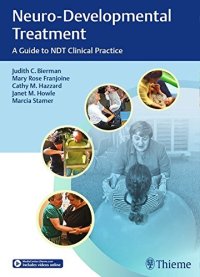
Ebook: Neuro-developmental treatment: a guide to NDT clinical practice
Author: Bierman Judith C., Franjoine Mary Rose, Hazzard Cathy M., Howle Janet M., Stamer Marcia Hornbrook
- Tags: Movement Disorders, rehabilitation., Physical Therapy Modalities., Psychomotor Disorders, rehabilitation., Neurodevelopmental Disorders, rehabilitation., Dyskinesias, rehabilitation.
- Year: 2016
- Publisher: Thieme
- Edition: 1
- Language: English
- pdf
This comprehensive volume provides vital support for both novice and experienced practitioners of Neuro-Developmental Treatment (NDT) by integrating the latest theoretical foundations of NDT with real-life practice examples. The book is the culmination of a 5-year project by instructors of the Neuro-Developmental Treatment Association to develop an up-to-date guide to the neurorehabilitation approach originally developed by Karl and Berta Bobath.
- Special Features:
- Presents the contemporary NDT Theory and Practice Model
- Covers the entire what, why, who, and how of NDT
- Includes thorough discussions of current and evolving research in neurorehabilitation
- Presents a detailed look at how occupational therapists, physical therapists, and speech-language pathologists practice NDT within the scope of the individual disciplines
- Illustrates NDT examination, evaluation, and intervention through a series of case reports spanning from infants to adults with posture and movement disorders
- Provides enhanced figures, diagrams, tables, photo galleries, and videos demonstrating therapeutic practice using the NDT practice model through access on Thieme's MediaCenter
- Provides educators with instructional materials and strategies for entry-level to advanced learners
- Written by more than 30 NDT practitioners (OTs, PTs, SLPs) giving a broad range of perspectives
Used as the core textbook in NDT Certificate courses, Neuro-Developmental Treatment (NDT): A Guide to Clinical Practice sets the standard in clinical practice for occupational therapists, physical therapists, and speech-language pathologists who use, or intend to use, NDT in their work with infants, children, adolescents, and adults with postural and movement disorders.